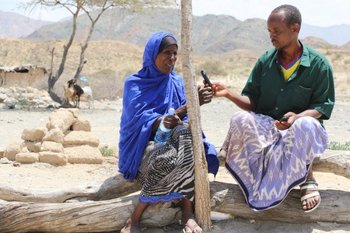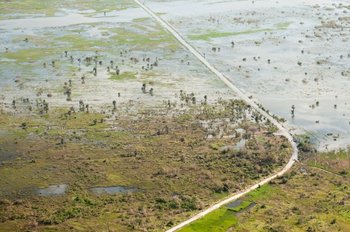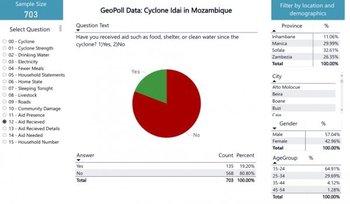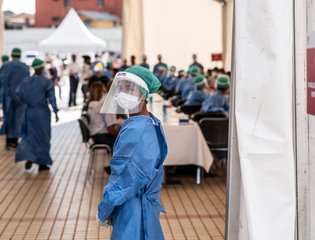Real-time data via mobile technology
Humanitarian actors should be able to track, in real time, the changing needs of communities and adapt their response accordingly to ensure aid is relevant..
However, lack of access to communities coupled with urgent timelines to deliver life-saving aid often means humanitarians are forced to respond with standard interventions that are not tailored to unique needs.

Photo credit: ECHO.
Mobile technology can be used to rapidly and remotely gather information about on-the-ground needs before, during and after a humanitarian response or during protracted crises, to ensure aid is relevant. Surveys via mobile phone can gather nuanced information from individuals already on the ground, with access to a mobile phone, who may otherwise be inaccessible and before aid workers are able to physically access an area. Mobile networks often remain partially operational following a disaster, and the growth in mobile penetration around the world makes it a valuable tool for collecting feedback. GeoPoll’s study in Mozambique following Cyclone Idai demonstrates that data collection via mobile phone is possible immediately following a disaster. As this technique is utilised more the methodology can be further refined to ensure that humanitarian support is relevant to communities’ needs and responsive to their feedback.
Cyclone Idai – Rapidly Tracking Humanitarian Needs
Following Cyclone Idai, which caused such widespread destruction in Mozambique that aid could only be delivered by air, basic mobile network connectivity was one of the first communications to be partially restored. This allowed the mobile surveying platform GeoPoll to rapidly deploy SMS messages to the hardest-hit areas inquiring about the current situation and needs.

Photo credit: ECHO
Surveys were free for participants to respond to and did not require participants to have mobile phone credit, enabling lower socio-economic communities to participate. Surveys sent via SMS, which can be received by phones even when they are turned off or out of service at the time of sending, are able to gather quantifiable data on the humanitarian response needed before services are even deployed. Once the response has started, mobile surveys can provide real-time feedback to aid organizations.
In the case of Cyclone Idai, GeoPoll used SMS to reach 700 households representing 4,700 individuals within 24 hours of the survey going live and just days after the cyclone’s landfall. Data gathered included damage to infrastructure and access to food, drinking water, electricity and aid. Of the respondents, 185 were located in the coastal city of Beira, one of the most devastated and populated areas hit by the storm. The capacity of mobile surveys to access the ‘unreachable’ was indicated by the finding that the majority of survey respondents had not been reached by humanitarian actors at the time of the survey; only 35% of respondents reported relief workers in their location. In total only 19% of survey respondents reported they had received aid, and in Beira, which was less accessible, only 13% reported they had received any form of assistance.

Photo credit: Geopoll.
Survey data also indicated a level of disconnect between the aid that had been received versus the aid perceived as most needed by communities themselves, highlighting the need for greater data-driven decisions in aid distribution. While 16% of respondents reported that they most needed cash, only 4% reported they had received cash aid. Respondents reported food as the most widely distributed form of aid, with 60% of respondents reporting they had received food aid, but only 32% reporting food as their greatest need. Secondary to food aid, 21% of respondents reported they had received shelter and 20% had received clean water.
A way forward
Mobile technology offers an opportunity to rapidly and remotely assess on-the-ground humanitarian needs before, during and after crises, to ensure aid is relevant. GeoPoll’s survey following Cyclone Idai demonstrates that data collection via mobile phone is possible immediately following a disaster and illustrates a model that can be replicated and adapted in other crisis contexts. To harness the power of technology collaboration between mobile survey experts and humanitarian actors is key and GeoPoll is committed to collaborating with humanitarians to track and demonstrate the relevance of aid via rapid mobile phone surveys.


